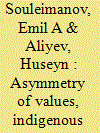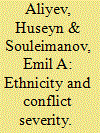|
|
|
Sort Order |
|
|
|
Items / Page
|
|
|
|
|
|
|
| Srl | Item |
| 1 |
ID:
142646


|
|
|
|
|
| Summary/Abstract |
This article fills the gap in existing scholarship on asymmetric conflict, indigenous forces, and how socio-cultural codes shape the dynamics and outcomes of conflict transformation. Specifically, it identifies three key socio-cultural values commonplace in honorific societies: retaliation, hospitality, and silence. As sources of effective pro-insurgent violent mobilisation and support from among the local population, these values provide insurgents with an asymmetric advantage over much stronger incumbents. Using the case studies of the two Russian counterinsurgencies in Chechnya, the article shows the mechanisms on the ground through which Moscow’s deployment of indigenous forces against insurgents helped to stem the tide of conflict, reversing the insurgents’ initial advantage in terms of asymmetry of values.
|
|
|
|
|
|
|
|
|
|
|
|
|
|
|
|
| 2 |
ID:
164823


|
|
|
|
|
| Summary/Abstract |
How does the presence of armed pro-regime groups affect conflict lethality? This study examines the relationship between ethnicity, militia violence and conflict lethality in civil wars. We emphasise that differences in whether pro-regime militias were recruited in accordance with their ethnicity or not are critical in their influence upon conflict lethality, which we estimate in battlefield deaths. To that end, we categorise militias into groups recruited on their ethnic basis (co-ethnic militias) and those recruited regardless of their ethnicity (non-ethnic militias). We hypothesise that conflicts are more lethal when non-ethnic militias are involved. We link higher number of battle-deaths in conflicts with non-ethnic militias with the militia use of one-sided violence against civilians. Co-ethnic militias – that is militias recruited from the same ethnicity as rebels – are deployed amongst their co-ethnics and therefore tend to target civilians less than non-ethnic militias. This militia–civilian relationship has direct impact on conflict severity. To test our hypotheses we conduct global statistical analysis of 84 intrastate conflicts from 1989 to 2014.
|
|
|
|
|
|
|
|
|
|
|
|
|
|
|
|
| 3 |
ID:
134592


|
|
|
|
|
| Summary/Abstract |
From its onset in 2011, the civil war in Syria has attracted foreign fighters from all over the world. Since around 2012, volunteers of North Caucasian origin, including Chechens, Dagestanis, Ingush and others have been at the forefront of international mujahedeen — a force of true believers of distinct backgrounds who have joined the war to advance what they consider to be the cause of Islam. When word spread of North Caucasians’ participation in the civil war, some praised their performance in combat, while others pointed to their excessive use of violence against civilians, a practice that has alienated thousands of ordinary Syrians. Like other mujahedeen groups engaged in the war, North Caucasian jihadists have experienced internal splits that have led to bloody infighting. According to some estimates, the North Caucasus has contributed the second-largest group of foreign fighters, following non-Syrian Arabs — a disproportionately high number relative to their demographics. As a result, what these fighters do and where they go after Syria represents a major security concern. If allowed to return to their homeland, North Caucasian jihadists — a committed and experienced force of hundreds of fighters with extensive contacts with jihadists worldwide — may pose an enormous threat to Russia's internal security.
|
|
|
|
|
|
|
|
|
|
|
|
|
|
|
|
| 4 |
ID:
190777


|
|
|
|
|
| Summary/Abstract |
Why do jihadi foreign fighters leave local insurgencies? While the literature on jihadi foreign fighters has mushroomed over the last decade, it has largely covered the perspective of individual motivations to join jihadi foreign fighter groups. The critical question of why individual jihadi foreign fighters leave local insurgencies, de facto recognizing the failure of their initial motives to join a distant armed conflict, has remained understudied. Drawing on the case study of Russo-Chechen wars, this article shows that a combination of popular hostility, loss of status, and poor living conditions urged jihadi foreign fighters to abandon local armed conflict.
|
|
|
|
|
|
|
|
|
|
|
|
|
|
|
|
| 5 |
ID:
174661


|
|
|
|
|
| Summary/Abstract |
What appears to be Russia's recent series of successes in the Middle East has been considered by many commentators as a sign of its rising power in one of the world's key regions. Indeed, alongside Iran, Russia has helped its key ally, the Bashar al‐Assad regime, which had been at the brink of collapse in 2015, to regain control over much of Syria. Moscow has also provided support to General Khalifa Haftar to make significant advances against his opponents in the Libyan civil war. This article questions these widespread assumptions. It makes the point that these successes have been rather minor and are likely to be short‐lived in the face of the challenges both Arab republics face. In spite of tactical gains, Moscow has trapped itself in the messy politics of civil‐war‐torn nations with a host of economic, political and social problems. Should Moscow benefit from its presence in these nations, it has to engage substantially in the costly postwar reconstruction, international support and — particularly in the case of Syria — convoluted entanglement of the often‐contradictory interests of regional powers. This article claims that, while Russia has little to gain from engagement in these challenging tasks, it is likely to be dragged into them.
|
|
|
|
|
|
|
|
|
|
|
|
|
|
|
|
|
|
|
|
|